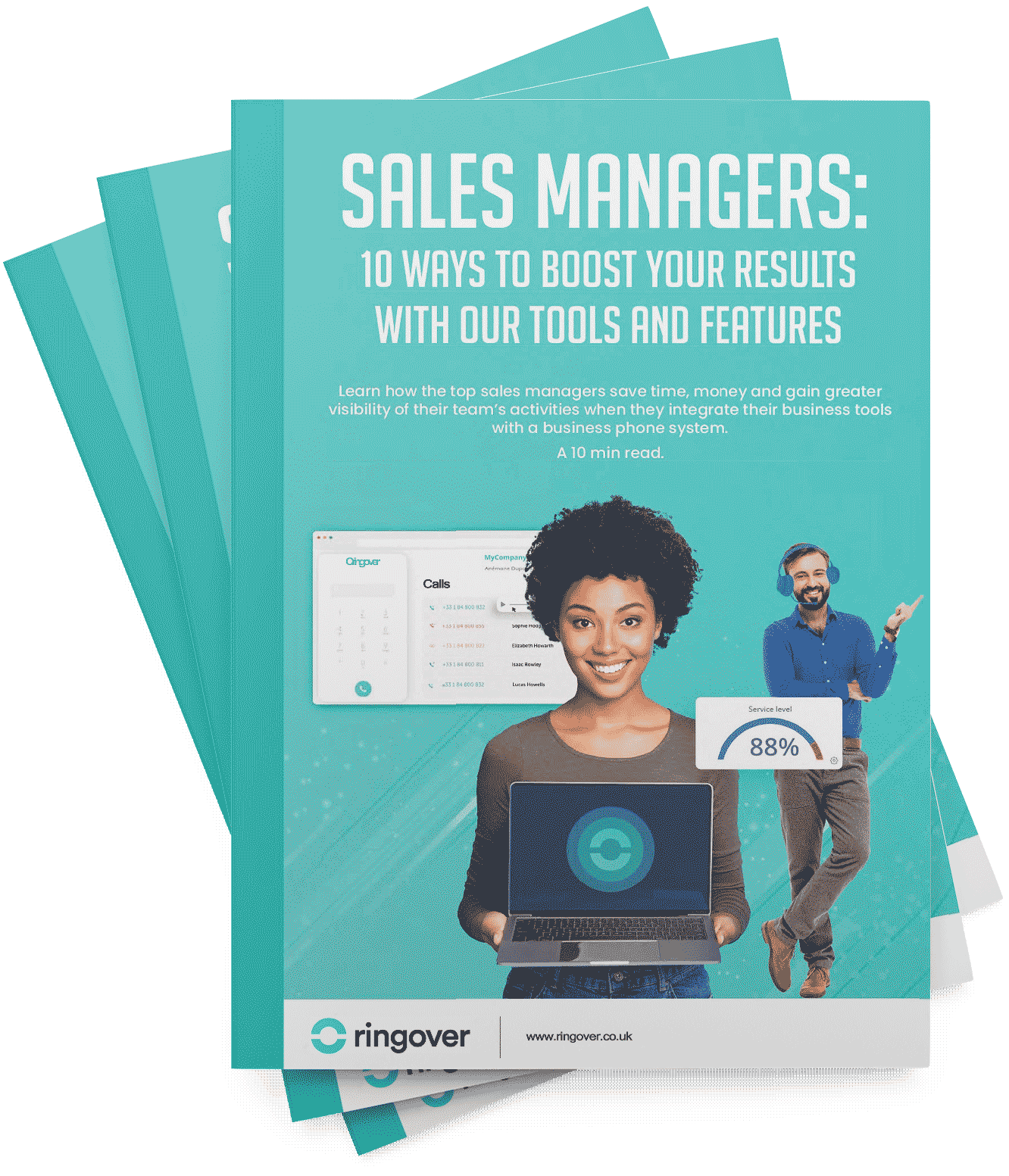Summary
What are the distinctive elements of these platforms in terms of customer relationship management? How can you determine which one will best meet your requirements and objectives?
Integrate Ringover With Your CRM
In this article, we will compare HubSpot and Salesforce, evaluating them on several key aspects such as the features offered, ease of use, integration capabilities, and user feedback. We will also highlight the advantages and disadvantages of each, while specifying the specific needs they are most appropriate for.
This analysis will provide you with a clearer understanding of the benefits that HubSpot and Salesforce can bring to your business, showing you how they can contribute to the improvement of your marketing, sales, and customer relationship management.
Comparison Table: HubSpot vs. Salesforce
| Criteria | Salesforce | HubSpot | |
|---|---|---|---|
| Good for | Getting a 360° view of prospects and customers | Increasing flexibility: this CRM is very marketing-oriented compared to Salesforce | |
| Specialised as | An account-centric CRM | Versatile CRM | |
| Strengths | Large selection of apps and integrations (AppExchange), and the Einstein suite for intelligent CRM management | A free plan is available, and an affordably-priced CRM suite, a quality automation and AI integration | |
| Weaknesses | Prices are too high for small sales teams, interface is outdated, difficult to deploy | Not very precise in terms of forecasting and reporting, difficult to set up integrations | |
| Flagship apps and integrations | Ringover (VoIP phone), Zapier, Docusign | Ringover (VoIP software), Calendly | |
| Free trial available? | 30-day free trial | 14-day free trial |
Comprehensive Summary of HubSpot
HubSpot positions itself as a comprehensive platform dedicated to customer relationship management, encompassing advanced tools for marketing, sales, customer service, content management, and business operations.
What truly sets HubSpot apart is its inbound philosophy, which aims to naturally attract prospects and customers instead of resorting to intrusive methods. HubSpot's primary goal is to provide an unparalleled customer experience, focused on personalization, automation, and precise performance analysis.
At the core of HubSpot's offering is a free Customer Relationship Management (CRM) designed for efficient lead and sales management.
The CRM enables the creation and sending of personalised emails, appointment scheduling, as well as the implementation of chatbots, quote generation, and document creation. This free CRM serves as the foundation for all of HubSpot's additional paid products, which include:
| Product | Key Features |
|---|---|
| Marketing Hub | Design of landing pages, forms, newsletters, blogs, advertising campaigns, and social media, marketing automation, detailed analytics, and more. |
| Sales Hub | Sales process automation, precise activity tracking, customizable pipelines, sales forecasting, enriched communication (calls, video, e-signatures), etc. |
| Service Hub | Ticket tracking, creation of a knowledge base, implementation of customer satisfaction surveys, customer service automation, analytics and reports, among other features. |
| Content Hub | Content creation supported by artificial intelligence, SEO optimization, content idea generation, content performance evaluation, and more. |
| Operations Hub | Data integration and synchronisation, process automation, data quality assurance, detailed reporting, etc. |
Additionally, HubSpot allows for the creation of personalised and adaptive websites through its dedicated tool. The platform seamlessly integrates with over 500 third-party applications, such as WordPress, Shopify, Zapier, among others. HubSpot also provides its users with training programs, certifications, a wide range of resources, and exemplary customer support.
Comprehensive Summary of Salesforce
Salesforce is a cloud-based Customer Relationship Management (CRM) platform designed to enable businesses to fully manage their customer relationships. From prospecting to after-sales service, including marketing and performance analysis, Salesforce offers a complete solution.
By leveraging artificial intelligence and data analysis, Salesforce aims to optimise the customer experience by making it as personalised as possible.
The Salesforce platform revolves around different products, each addressing specific business needs. Here is an overview:
| Product | Key Features |
|---|---|
| Sales Cloud | Complete administration of leads, opportunities, contacts, accounts, quotes, contracts, orders, invoices, etc. |
| Service Cloud | Integrated management of tickets, cases, solutions, knowledge bases, communities, chatbots, multichannel communication (phone, chat, social media), etc. |
| Marketing Cloud | Comprehensive tools for marketing campaigns, including email management, SMS, notifications, advertising, social media, landing pages, forms, webinars, etc. |
| Commerce Cloud | Dedicated platform for sales teams to manage websites, mobile applications, catalogues, shopping carts, payments, promotions, recommendations, etc. |
| Platform | Tools for developing custom applications, including integration features, workflows, reports, dashboards, etc. |
| MuleSoft | Solution for data integration, applications, systems, services, etc., facilitating connection between different platforms. |
| Tableau | Powerful data analysis and visualisation solution, allowing exploration and discovery of business insights. |
| Slack | Collaboration and communication platform within teams, with file sharing, messaging features, etc. |
Additionally, Salesforce allows for the creation of personalised and responsive websites through its site editor and offers seamless integration with over 5,000 third-party applications, such as Gmail, Outlook, WordPress, Shopify, etc. The platform also provides training, certifications, various resources, and top-notch customer support.
Salesforce vs. HubSpot (Reviews): What Do Users Think?
When comparing Salesforce with HubSpot, it's crucial to consider the opinions of users who have tested them. Here is a summary of the various platforms where users provide verified reviews.
| Product | G2 | Capterra |
|---|---|---|
| HubSpot Marketing Hub | 4.45 | 4.55 |
| HubSpot Service Hub | 4.45 | 4.45 |
| HubSpot CMS Hub | 4.55 | 4.65 |
| HubSpot Operations Hub | 4.55 | NA |
| HubSpot Sales Hub | 4.45 | 4.55 |
| HubSpot CRM | 4.45 | 4.55 |
| Salesforce Sales Cloud | 4.35 | 4.45 |
| Salesforce Platform | 4.55 | 4.35 |
| Salesforce Service Cloud | 4.35 | 4.45 |
| Salesforce Marketing Cloud Suite | 4.05 | 4.25 |
| Salesforce Revenue Cloud | 4.25 | 4.35 |
User Reviews on HubSpot (Summary)
HubSpot users praise its intuitive user interface and inbound marketing-focused approach. They highlight the platform's ease of use, top-notch marketing automation tools, as well as its robust customer relationship management (CRM) capabilities.
User Reviews on Salesforce (Summary)
Users often commend the depth of features in Salesforce solutions and the robustness of its cloud architecture, which ensures data security, accessibility, and seamless integration for various business processes.
HubSpot vs. Salesforce: Key Takeaways
After analysing the features, advantages, and disadvantages of HubSpot and Salesforce, it's crucial to summarise to help you choose the most suitable CRM for your business. The key points of this comparison are:
- HubSpot and Salesforce offer comprehensive CRM solutions, covering all aspects of customer relationship management, from marketing to after-sales service, including sales and analysis sectors.
- HubSpot shines with its ease of use, free offering for the basic CRM, inbound strategy, as well as advanced features in marketing automation and reporting.
- Salesforce stands out for its customization capabilities, functional depth, use of artificial intelligence, and numerous integrations with third-party applications.
- HubSpot is particularly well-suited for small and medium-sized businesses seeking an intuitive, cost-effective, and versatile solution to attract, convert, and retain their customer base.
- Salesforce is ideal for large enterprises with complex, specific, and evolving requirements, aiming to manage, optimise, and analyse their business performance.
In summary, HubSpot and Salesforce are two leading CRM solutions, meeting different needs and objectives. The choice of the best CRM is not universal. It all depends on your context, budget, and aspirations. To facilitate your decision, we recommend testing both platforms for free while comparing their features, user experience, and expected return on investment.
Conclusion
You now have a refined understanding of the key distinctions between HubSpot and Salesforce, the two giants among CRM solutions available in the market.
You've identified that HubSpot excels in simplicity, affordability, and versatility, while Salesforce stands out for its extensive features and advanced intelligence.
However, the decision to choose the tool that best fits your business is yours. It should be anchored in the analysis of your specific context, budget, and strategic ambitions.
To guide you in this decision-making process, we suggest experimenting with both platforms for free to personally evaluate their strengths and weaknesses.
Don't miss the opportunity to amplify your business's success with the benefits that a competent CRM system can bring!



